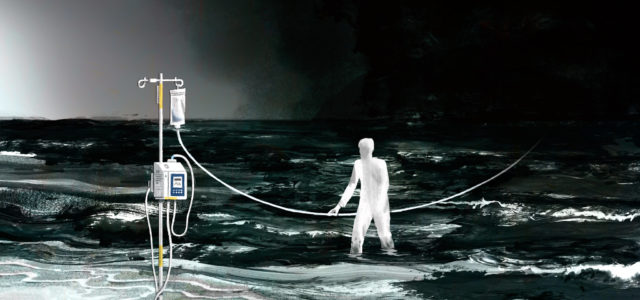Articles About Bipolar Disorder from Lori Calabrese, MD | The Ketamine Blog
Serious and Complex Condition
Bipolar disorder’s symptoms demonstrate a complex brain and behavior disorder characterized first and foremost by severe mood swings. Secondly, it includes an inability to regulate your emotions and responses Because of that, you have times of extreme emotional lows we call bipolar depression, and times of extreme highs we call mania or hypomania. Therefore, sometimes you suffer through both at the same time.
It’s notable that each mood can last for months or weeks or days… or even hours before it swings just as severely to the other extreme.
Sadly. people with this disorder often face suicidal thoughts, or specific plans for ending their lives. In addition, they show impulsivity. The result of the combination of impulsivity and suicidal thoughts is a dangerous mixture, that far too often ends in fatality.
For this reason, this disorder reduces longevity by an average of 25% less than healthy persons.
These articles about bipolar disorder are available to you to help you understand this condition better, and hopefully to better understand the one who suffers with it.
Causes of Bipolar Disorder
While we don’t know exactly what causes bipolar disorder, we do know that a combination of genetics, environment, altered brain structure and chemistry all contribute.
For one thing, we know the amygdala and hippocampus play significant roles in this disorder. These structures in the brain help form new memories and process learning and emotions.
As a result, when the hippocampus and amygdala malfunction, the result can be a mixture of memories that store painful emotions that are so relentless that the sufferer finds it difficult to recover from hurts and traumatic events many years later, as well as to forgive someone who has hurt him.
These difficulties cause severe distress for the sufferer who finds it almost impossible to let go of traumatic memories and loss. Instead, he suffers the full pain of the memory each time it comes to mind.
Cheating Death
So, a damaged amygdala can lead to a lack of natural fear of danger. Furthermore, possibly linked to this is the pursuit of adrenalin-stimulating opportunities. A common trait in those with bipolar disorder, you tend to crave danger, thrills, and activities that “cheat death”… and other forms of high risk behavior. Since the amygdala consists of two parts – one on each side of the brain – if both are damaged it results in the sufferer’s inability to distinguish emotion response in the facial expressions of others. Consequently, this type of damage may be linked to autism.
Symptoms
Symptoms of bipolar disorder can include:
-mood swings
-difficulty regulating emotion
-intense outbursts
-rapid pressured speech
-hypersexuality
-high risk behavior
-visual and/or auditory hallucinations
-grandiosity
-delusions
-severe insomnia
-hypersomnia
-suicidal thoughts
-feelings of worthlessness
-hopelessness
-despair
-lack of energy or hyper-energy
-difficulty focusing or retaining information
-shame, low self-esteem and therefore sometimes a belief that one has low intelligence
Mixed States
Some people experience long periods of depression with negative beliefs about themselves, then long periods – or short periods – of mania or hypomania with all the more energized symptoms, including overconfidence and grandiosity. In addition, some people suffer from mixed states which is a mixture of both.
At the same time, this person may experience high energy, sleeplessness, racing thoughts, and rapid speech combined with irritability, rage, explosiveness, despair, and suicidal inclinations.
Types of Bipolar Disorder
Bipolar 1 – most intense and severe
Bipolar 2 – also can be severe, consists of longer periods of depression interrupted by hypomania, which is less intense than mania.
Cyclothymic Disorder – shorter periods of less intense depressive symptoms alternating with shorter periods of hypomanic feelings.
Fear of Harm Bipolar Disorder – begins in children and consists of acute fear of harming others and/or of being harmed.
Bipolar Disorder of each type is a serious disorder. Continue reading these articles about bipolar disorder to learn more.

Like other disorders of the brain and mind, bipolar disorder is complicated. With all the movies and cartoons made at the expense of people who suffer from disorders like this, we want to help more people know more about some of the facts with a bit of bipolar science. It’s different for each person. The […]
Continue Reading

Stigma Isolates, Humiliates, and Separates As I think about what to write today, my thoughts are filled with a comment I received from a man who’d read last week’s blog, which you can read here. He wrote that he also suffers from bipolar 1 disorder and was upset and hurt by the description of the young […]
Continue Reading

“I don’t care what the &%@!* you think!! It’s all your fault!! I’m outta here!!!” With that, Ben picked up the massive carved oak coffee table and threw it at the window. It hit the window and the wall with a thud, pushing the window frame in a contorted mangle of metal and glass out […]
Continue Reading

If you struggle with bipolar disorder, and the symptoms that seem to dominate your life, it may help you to know that many psychiatric disorders don’t really come with a list of predictable symptoms. If you have times when you’re short-tempered, highly energetic, sure of yourself, and quick to argue, you may have a mood […]
Continue Reading

“Though I am often in the depth of misery, there is still calmness, pure harmony, and music inside me.” —Vincent Van Gogh May is Mental Health Awareness Month, and I’ve been thinking about how to disrupt the stigma of “mental illness.” It’s a term I don’t like – but it’s still used throughout the world, […]
Continue Reading

In a world where things go wrong and people get sick, every once in awhile something comes along that makes things right again. I’m talking about something that’s so dramatic in its solutions we’re tempted to call it a “miracle.” But we won’t. We’ll call it a game-changer. Because IV ketamine treatment is changing history. […]
Continue Reading

The anesthetic-cum-party drug restores the ability to make connections among brain cells. The Food and Drug Administration’s approval last month of a depression treatment based on ketamine generated headlines, in part, because the drug represents a completely new approach for dealing with a condition the World Health Organisation has labelled the leading cause of disability […]
Continue Reading

An article published this past Friday, Nov. 30, 2018, in the New York Times Opinion section, asks about a possible remedy for suicidal thinking. Well researched, but not quite well enough. Keep reading… Author Moises Velasquez-Manoff explored the notion that maybe…just maybe…we can quell the epidemic rate of suicide. He points out that the suicide rate […]
Continue Reading

KRIYA!! The most phenomenal ketamine conference to date! Last weekend I attended and presented at the ketamine KRIYA Conference 2018 in San Francisco. This conference emerged as the most dynamic gathering of front-line ketamine practitioners I’ve ever experienced. And what an event! The ketamine KRIYA Conference 2018 was extraordinarily different than any other research […]
Continue Reading

Most misunderstood symptom of bipolar disorder that divides families, shames sufferers, and hurts those who love them… BEGS to be treated before damage is done. It was 1am. Deftly, he slid the window open and quietly climbed into the room. In a moment his clothes were off and he was under the covers. 14-year-old Jillian […]
Continue Reading









